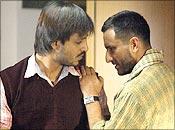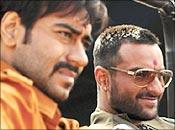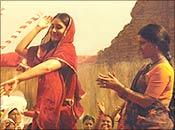A sixer, a sixer," I was shouting excitedly as the white ball soared high above the lights in the clear night sky and cleared the fence. I had stood up and was waving my arms. So were others all around me, standing, shouting, raising their arms. But some were turning to look at me, with a hint of incomprehension or irritation.
"Stop that, please stop that immediately and sit down," advised my American friend Paul, who had taken me to the stadium, no, let me get this right, to the ballpark. "You came to learn, not yet to participate, let alone use some strange lingo for a homerun. Cricket, I guess," he now said as I sat down somewhat shamefacedly.
I looked around. It was indeed a beautiful night and a beautiful sight. This was the ATT ballpark in San Francisco, a real zinger of a park, to use the American jargon, with tiers and tiers of seating all with a view of the Pacific Ocean.
There was a sea of humanity, a familiar and heartwarming sight to any Indian with all the imprinted cricket memories, but there was something unfamiliar as well. More than half the crowd seemed to be constantly eating or drinking: mouthwatering but mouth stink generating garlic fries, hot dogs, corn dogs, hamburgers, and gigantic Styrofoam cups of beer or coke.
There was a menu of options, not only in terms of food, but also as to how to get it- kiosks and stalls behind the seats, orders delivered to you, regular restaurants within the stadium, snacks brought from home and some more. True to the American spirit there were shops everywhere, even inside the stadium, all selling baseball caps, T-shirts, sweat shirts, refrigerator magnets and a hundred other trinkets with the logo of the Giants, the name of the baseball team of this city. Today they were playing the Pirates from Pittsburg.
Why had I gone to see this strange and incomprehensible ritual? Good question. To answer, I must go back a little in time.
"What do you think of Barry Bonds?" Paul had asked me one day when we had met during our morning walk.
"Who?"
"Barry Bonds. Don't you read the papers? He has hit 715 homeruns and equaled Baby Ruth's record."
"Baby Ruth? I don't follow this stuff. Baseball, I presume and not basketball?"
"You presume right, if I may be as British as you Indians are. But seriously you cannot be a diplomat in America, wanting to understand this country, without knowing baseball. We must remedy this." Paul epitomises the American speech-direct, frank and friendly.
This had eventually led to him making arrangements to take me to a game, a Giants game, and to educate me live on the field.
To be truthful, actually this was not the first time that I had been subjected to such treatment. My school day enthusiasm for cricket had gradually waned a long time back and after serving in many uncivilised European countries with no cricket, I was sent to Sri Lanka as deputy high commissioner, some years ago.
It was my early days as yet in Colombo and someone had asked me what I thought of Kaluvitharana's aggression. I was wondering as to which of the many Tamil outfits he belonged to. My interlocutor had said, "Mr Prakash, you cannot be an Indian diplomat in Sri Lanka and be ignorant of cricket."
It was a sound and strategic advice. Over time, in that difficult period in Sri Lanka, I had learnt that the one safe and happy topic to discuss with Sri Lankans was cricket, particularly as Sanath Jayasurya and Aravinda De Silva were trouncing us in the World Cup. Each time we lost, India became that much more popular and our job in the embassy that much easier! And I had become a cricket bhakta once again with some fervour and devotion.
But education is never complete, particularly for a diplomat as I was discovering. Cricket is one thing and baseball quite another. Today I was in this strange field, though recognisable from a hundred American movies. What I was recognising though were the peripherals, the food, the striped dress of the players, the round baseball bat, the noisy and festive announcements that filled the park from commercials, and above all the hot dogs, associated for us forever with America and the baseball game.
The rest of the game was a mystery with various comings and goings, sudden bursts of activity with a period of lulls and occasional sixes with plenty of balls being collected behind the invisible wicket, as there were no wickets.
"This beats me. I don't follow it at all," I complained to Paul.
"You can observe a lot just by watching. That is a direct quote from Yogi Berra," said Paul, chuckling. I had heard of the legendary Yogi Berra, a baseball player of yesteryears made immortal not for his play but for his most innovative ways of anguishing English.
"I actually want to understand."
"OK. Stop thinking of cricket. It is actually pretty simple. Come let me explain outside as we go for a beer," he said and this is what we did.
Seated again and with some enlightenment I wondered at baseball's similarities and differences with cricket. This is not the place to attempt a tutorial on baseball and I don't intend it. But a word or two on the philosophical and psychological distinctions between our national passion and that of America may be in order.
Historians of baseball do admit that it was brought to the new continent from England and thus owes its origin to cricket and some other English games. Why did it change so much and become this simpler, faster and shall we dare say cruder game-no disrespect for baseball or respect for cricket intended?
I would theorise and surmise that unlike the leisurely feudal classes of England who played by courtly rules, the men who had set out to win an untamed frontier wanted to just pitch and hit, not bowl with elaborate motions or bat with a 'straight bat'. 'Baseball is 90% physical, the other half is mental,' to quote the famed Yogi Berra.
The eminent sociologist Ashis Nandy has argued that cricket may have been invented in England, but is essentially Indian in temperament. It is a game when an individual is also battling fate apart from the opposite side. Hence a Tendulkar or a Sehwag getting out on the first ball and sitting out for the rest of the innings.
America's spirit is to reject fatalism, to get up if there is a failure and demand a second chance. And a third. Hence the practice that in baseball there are nine innings and in each one a batter (simply a batter, not a batsman) has to get out thrice to be truly 'out'. Many choices to prove your worth. And unlike the aristocratic English or the consensual Indian, there can be no 'draw', one side has to win, one side has to be vanquished.
I reflected on all this as the game proceeded and after nine innings ended in a climax with a score of 5-3, which to me looked suspiciously like a football score after the penalty knock out.
"Is that it? The game is over in three hours with five runs?" I asked Paul.
"What else? How long does cricket last, a whole day?" he asked ignorant of the irony of his question.
I did not answer him directly. Instead I told him a story well known in the foreign service of one of our ambassadors who had set out to organise a cricket match in Beijing some decades ago.
This ambassador was a great cricket fan and no mean cricketer himself. So was the British ambassador of that time in China. Both of them decided that it would be fun to have a friendly match between the British XI and a Commonwealth XI with Indians, Australians and some others. The task of fixing a stadium by talking to the Chinese authorities was given to the Indian ambassador, whose persuasive skills were superior.
He was received with the due courtesies and formalities in the Chinese foreign ministry who promised to help the diplomats with a ground.
"From what time to what time Your Excellency?" the Chinese official asked.
"Well, er... let us say the whole day."
"What? The whole day? Surely cannot be..."
Our ambassador, himself a great cricket purist, explained patiently that what they were planning to play was an abridged and corrupted version of the great game, which the classicists were not happy with. It was normally played for five days, he explained, with a rest day, but they were just playing a friendly match in this simple version.
The Chinese official thanked him and said a decision would be conveyed. The decision never came. It was hinted later that a game of this nature, so decadent, taking five days, if it permeates even by accident, would corrupt the Chinese system so totally that it could not be permitted.
 Maybe the reason the film
Maybe the reason the film  The players, and their choosing: While on beauty, it is impossible to not be mesmerised by Kareena Kapoor, who looks her best as she fittingly plays Desdemona. 'That whiter skin of hers than snow and smooth as monumental alabaster,' as the dark Moor described his bride, is positively luminous in Kareena's Dolly Mishra. Her character is one of the hardest to essay, as she goes through love and awe, fear and bewilderment, defiance to her father and submission to her man.
The players, and their choosing: While on beauty, it is impossible to not be mesmerised by Kareena Kapoor, who looks her best as she fittingly plays Desdemona. 'That whiter skin of hers than snow and smooth as monumental alabaster,' as the dark Moor described his bride, is positively luminous in Kareena's Dolly Mishra. Her character is one of the hardest to essay, as she goes through love and awe, fear and bewilderment, defiance to her father and submission to her man.  Sights and sounds: Omkara is a slow film, a poetically drawn out work that mercifully doesn't try to rush itself. The violence, while rampant, remains atmospheric -- it is there for effect, as a backdrop, to pretend that the film has pace. Cinematographer Tassaduq Hussain -- whose short films made as a film student in the US thrilled Vishal -- has framed the film deliciously, each shot neatly boxing in light, shadows and high drama. Samir Chanda's art direction is masterful, the sets evocative and realistic, exaggerated enough to be theatrical while detailed enough to be convincing.
Sights and sounds: Omkara is a slow film, a poetically drawn out work that mercifully doesn't try to rush itself. The violence, while rampant, remains atmospheric -- it is there for effect, as a backdrop, to pretend that the film has pace. Cinematographer Tassaduq Hussain -- whose short films made as a film student in the US thrilled Vishal -- has framed the film deliciously, each shot neatly boxing in light, shadows and high drama. Samir Chanda's art direction is masterful, the sets evocative and realistic, exaggerated enough to be theatrical while detailed enough to be convincing.